The tip dropped into my inbox on a cold February evening. “If you give me an address to drop the package of details I am often in Brum. I trust in your discretion though, I have relatives at the farm. Yours, TerryP.”
This nugget of information had been prompted by a feature I wrote for The Dispatch, exploring the work of filmmaker Jonathan Meades. The piece touches on the set of DIY cabins known as plotlands, clustered in the Severn Valley, near the picturesque Worcestershire town of Bewdley. These cabins are a rare, and historically significant, example of interwar working-class architecture. Their rural location means they don’t get the cultural recognition of the publicly-funded Brutalist estates of the 1960s — those who know of their existence are almost members of a secret club.
Bewdley is, perhaps, the crown jewel of the plotlands movement — it’s one of the biggest UK sites, home to roughly 163 households. But now, said TerryP, these dwellings were under threat. The offender? A “notorious mobile home park owner,” wrote Terry, with a “list of intimidatory tactics is as long as your arm.” I was intrigued.
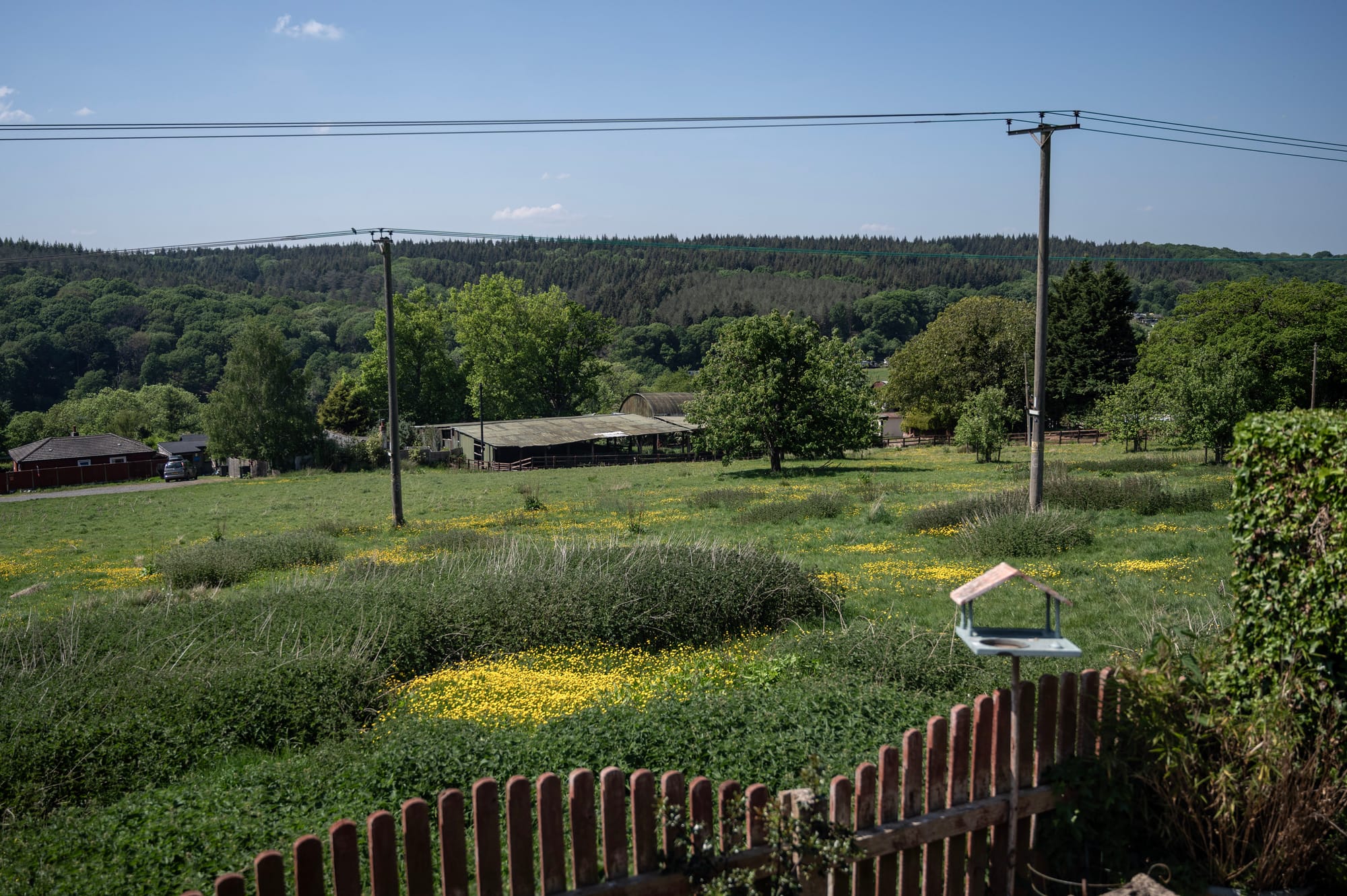
After days of research, a trip to rural Worcestershire and lots of unanswered emails, I’d uncovered a saga involving dead horses, a legal case no one will — or can — talk about, and a landlord allegedly disrupting the water supply to push tenants out — a potentially criminal offence. Clearly, trouble was afoot.
Paradise lost?
Terry P wasn’t the only Bewdley cabin dweller to reach out. After his email, I got a flurry of messages. All of them allege the same, basic story: that an unscrupulous landowner is using underhand tactics to force residents out and destroy a relic of an older, more eccentric, bohemian England. The plotlands are a relic of an age before the 1947 Planning Act, when people often built dwellings wherever they liked. For certain working class Brummies and Black Country folk who wanted to get away from the smog and poverty of the city, this meant hauling construction materials to the bucolic Severn Valley via train or by motorbike to build holiday cabins on the cheap, trading on the poverty of local farmers’ to buy tiny plots of leased land. The earliest cabins sprang up in 1928; over time they became permanent residences gaining council recognition in the 1960s.
Sorry to interrupt. We hope you're enjoying this article. We just wanted to give you a heads up that you can join our free mailing list and get two editions a week for zero pounds, zero pence. Again: that's two editions of our richly-reported narrative journalism, completely free. Hit the button below to sign up.
Last week I jumped on a train, and then took an Uber out to Bewdley. Travelling out from Birmingham to Bewdley plotlands feels like entering an idyllic Hayao Miyazaki version of England: small cabins sit in-between verdant green hills, the Severn river drifts lazily by, and a tiny steam powered train chuffs along in the background. In Bewdley itself, I queue for chips and hear a builder discussing the ongoing issues: “he wants to put caravans there,” the man comments. “But it's a historic site. I don’t reckon he’ll manage.”
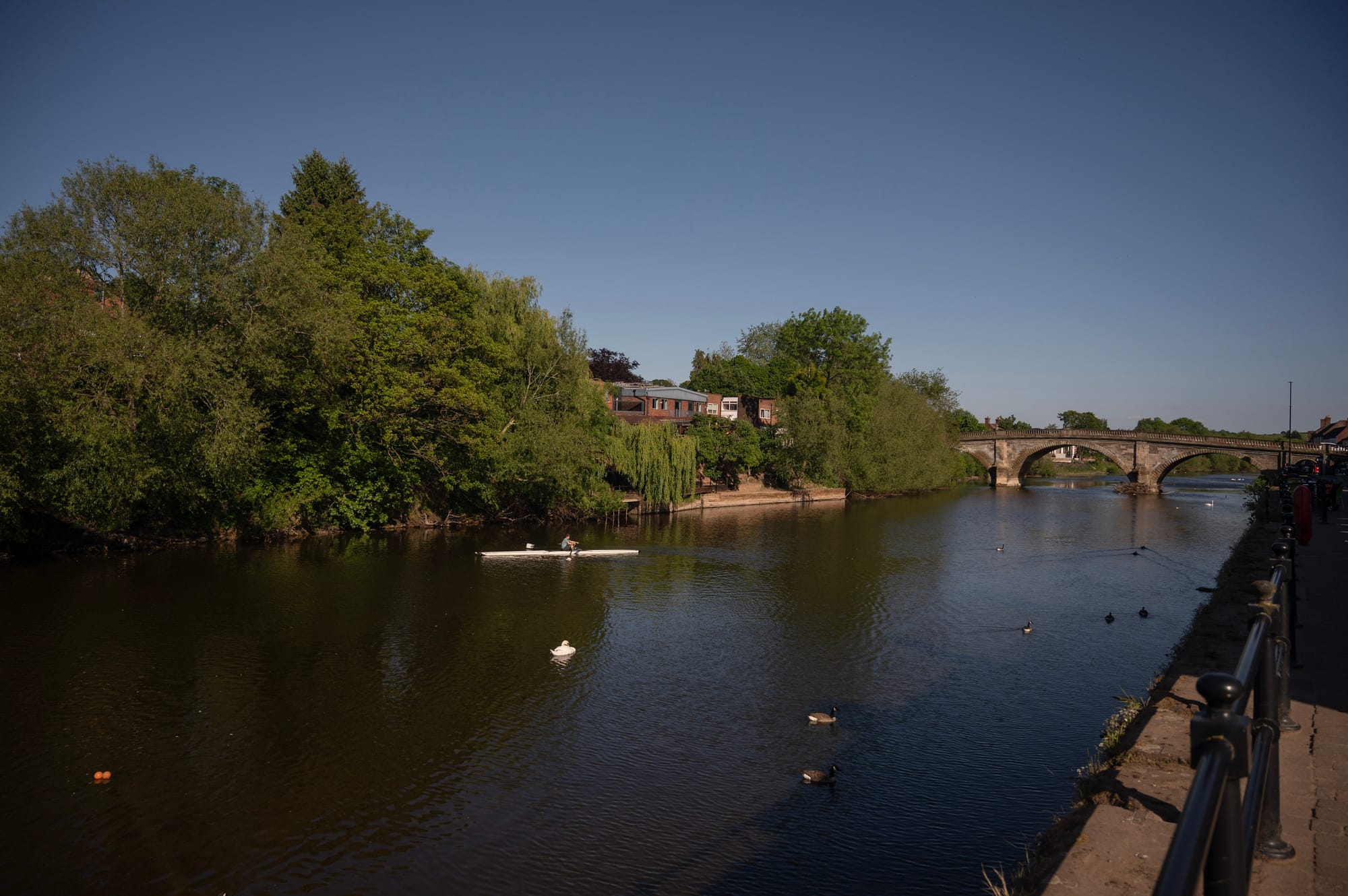
The ‘he’ in question, I am to discover, is an elusive multi-millionnaire named Michael Wenman, the chief antagonist in this story, at least according to the Bewdley cabins’ residents. Between 2020 and 2021, Wenman — who, as of 2023, owns an estimated £30m of assets — bought Hill Farm, the land that sits beneath the cabins. Shortly afterwards, the trouble started. “He’s a nasty man,” one elderly resident tells me.
Relations between the plotlanders and the previous landowners, the Halfords, had been cordial. Yet within a few months of Wenman buying the farm, eviction notices began dropping through the letterboxes of residents — even though he doesn’t have such jurisdiction. Wenman owns the land’s freehold — the plotlanders own the leases on the cabins, which gives them the right to occupy them for as long as the lease period stipulates.
That wasn’t the only change; residents say they received warning that the yearly ground rent for the land their cabins stand on was being increased from £1600 to £5000 — a jump of 300%. One day, plotlanders noted huge floodlights being installed around their cabins; that night they quickly discovered why, as high-powered LED beams invaded their bedrooms, keeping several awake until late.
Worse was to follow. In 2021, the taps ran dry — allegedly the water supply had been switched off. Since then, access to fresh running water has been sporadic. Some residents say they’ve been without regular water for years; others report getting a dribble from a tap every now and then before it’s gone again.
This had never been an issue before. Water rates are included in the ground rent, and all residents are up to date with their payments. Rather, residents allege Wenman is responsible, whether through actively disrupting the supply or by negligence. Down the hill are another set of cabins attached to a different freeholder who have not seen similar disturbances to their water supply.
Legally, there are strict protections for water access for tenants and leaseholders. “If your landlord disconnects your water supply to try to make you leave the property, this is a form of harassment and is a criminal offence,” counsels Citizens Advice. However, so far, nothing has been proven. Wenman did not comment when we put the allegations of interfering with the water supply to him.
At a cabin tucked into the hills, I meet veteran plotlanders Peggy and Richard who have been at the site for fifty years. Their home resembles a mini-Versailles, designed by Richard around a huge mahogany table. Like many cabin inhabitants, they are elderly and increasingly infirm: recently Richard has suffered a series of strokes and Peggy is dealing with a cancer diagnosis. They’d planned to spend their remaining days up in the countryside with their grandchildren. Now, the future looks uncertain.
“We’ve loved every minute of it here,” Peggy tells me, wiping away tears: “before all this started.”
Their water supply has been intermittent for a period of five years (some residents have been without water completely for over a year). “No water, you basically can’t have a shower,” Peggy tells me. Their only dependable water source comes via Peggy’s daughter Jane who also lives on the plotlands and has to ferry big bottles up to the cottage. “I’m constantly bringing thirty, forty, bottles down,” she says. “No one will help us.”
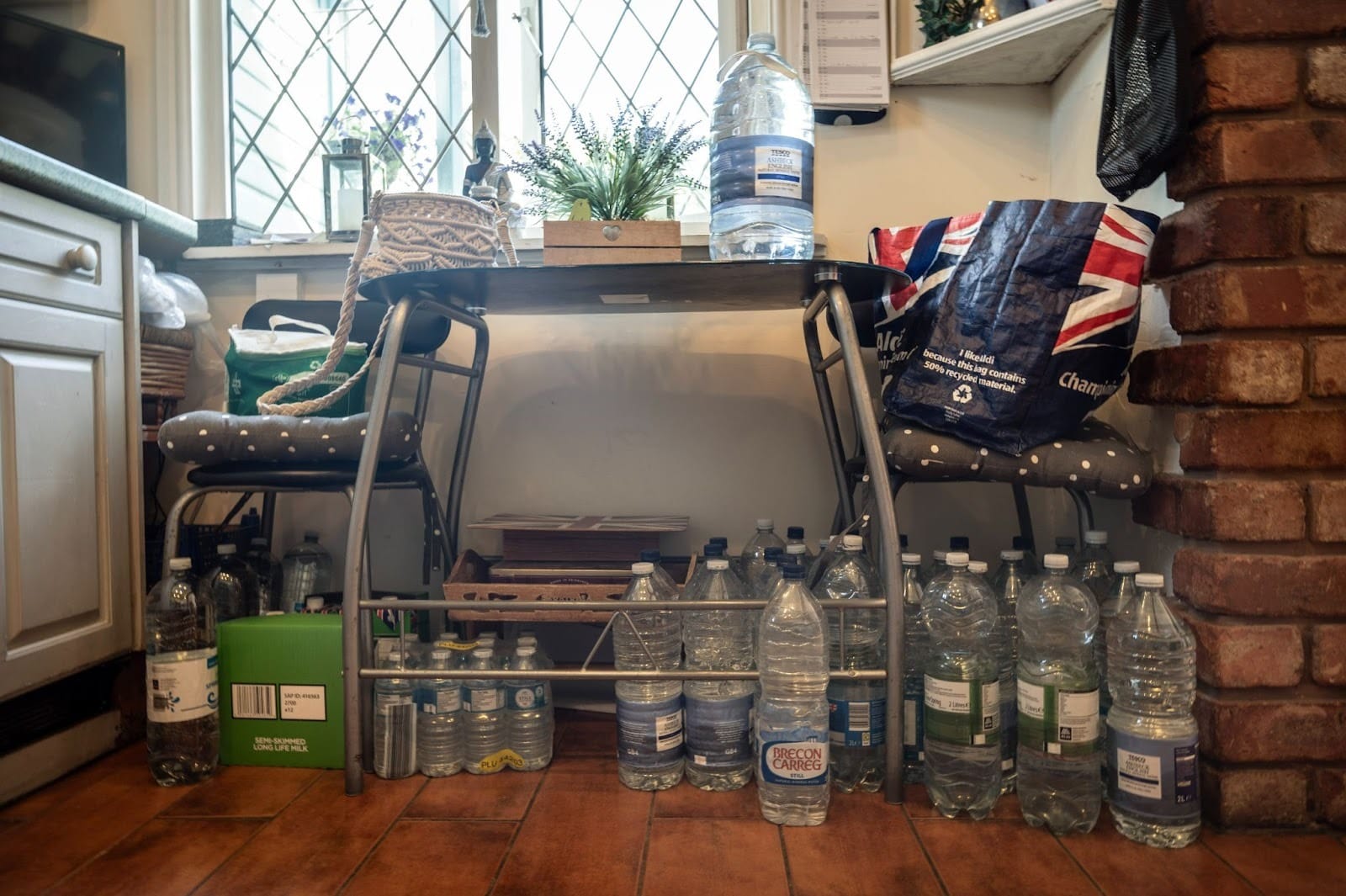
Peggy tells me they’ve contacted the mayor of Bewdley, Severn Trent water company, Wyre Forest district council, and local Conservative MP Mark Garnier, to no avail (Mark Garnier told The Dispatch: “I remain highly concerned for the welfare of residents living at Hill Farm. As I have made clear to local authorities, access to water is a basic human right and I will continue to speak-up on behalf of the impacted local residents.”)
“They’re no help,” Peggy says. They’ve been repeatedly told that because they’re on “private land” nothing can be done. As for the man they believe to be responsible, he’s essentially uncontactable.
“I don't know how many times I’ve rung Wenman’s number, he will not answer. I’ve left messages,” says Jane. “He’s never, ever, got back to me.”
Down the hill live Gill and Tina, who are also part-time carers for a long-term elderly resident Ted, who is in the early stages of dementia. I sit in Gill’s cabin, with its expansive view of the Severn Valley, as Tina explains Ted’s situation. “He’s got ulcerated legs, ain’t he,” she says. “The nurses visit twice a week to try and clean him. Of course, when there’s no running water it’s not easy.”
Across the way are couple Sandra and Steve, a plotland dynasty. “The plots have been in the family for eighty years,” Steve says. “One of my granddad’s brothers came down here camping before the war on bicycle, then he came down with a motorbike with wood on the back.”
“The water situation is awful,” Sandra laments. “Some days you can have a wash, some days you can’t.” Steve chimes in: “We often have to go down to our daughters in Hagley for a shower.” He’s currently ill, and has a stoma bag. “He needs to keep it clean which is very hard when you have no water,” Sandra tells me. Both of them feel abandoned by the authorities and the previous owners. “The former farmer sold up and sailed down the river, didn’t he?” Sandra jokes.
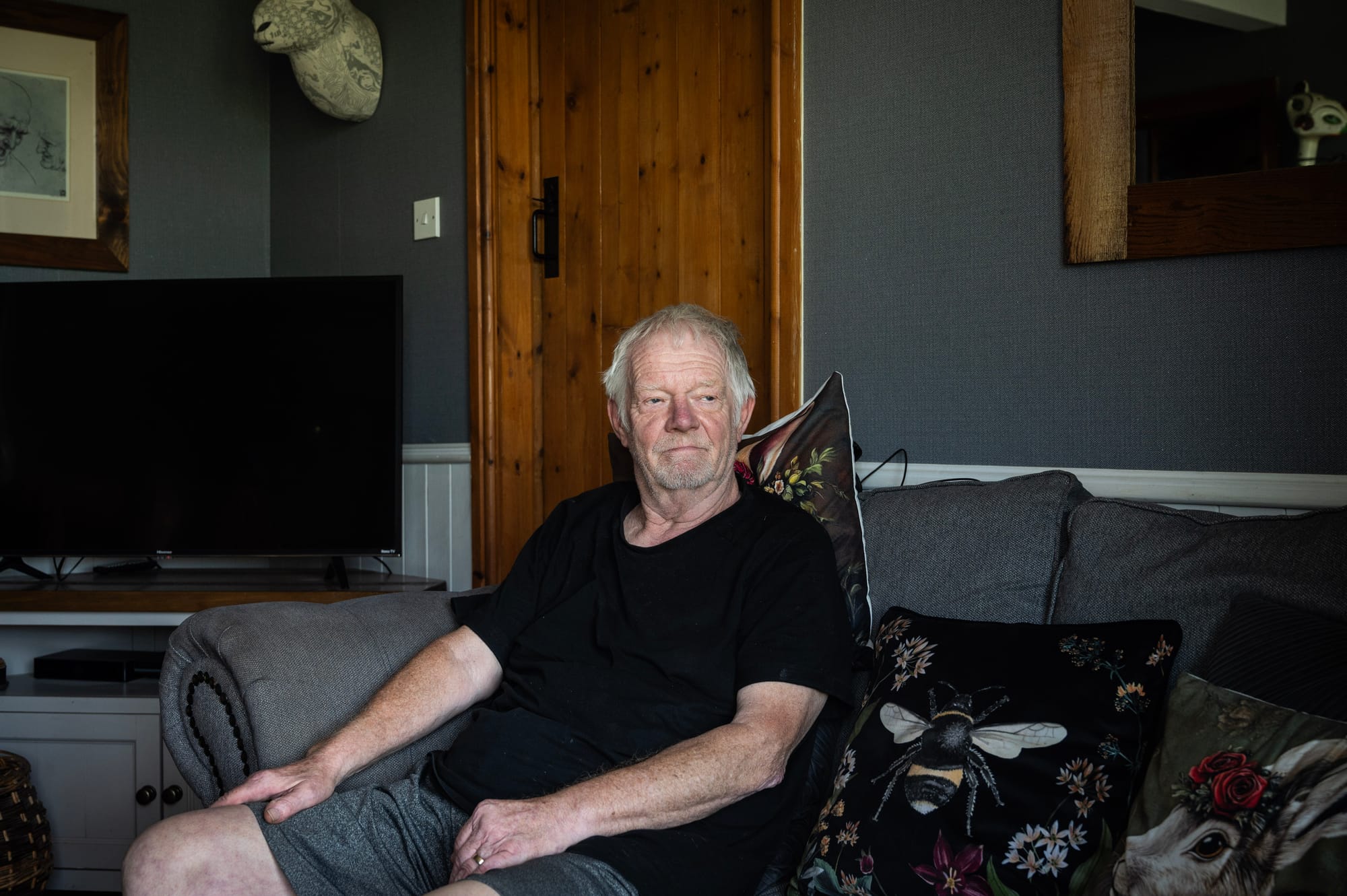
Next door live Jan and Glenn, a retired teacher and mechanic. Glenn comes in from working on his car and turns the tap on. Nothing comes out. “It ain’t human is it?” he asks rhetorically. The pair are concerned about potential fires.
“When these fields are dry, it’s a massive fire risk,” says Jan. “[Wenman] never cuts the fields. We know not to throw a cigarette out of the window, but van men that come up? We’ve been terrified for the last couple of years.”
No one I speak to at the cabins seems to know, ultimately, who’s responsible for ensuring they have water: utility company Severn Trent or the freeholder of Hill Farm. “It’s like we’re stuck between different worlds,” one resident tells me. After being contacted by The Dispatch for this story, a spokesperson for Severn Trent said: “as the Bewdley Plotlands is private land, it isn’t monitored by Severn Trent. As is always the case with pipes on private land, maintenance of the water pipes at the plotlands is the responsibility of the landowner.” They added that, “as a gesture of goodwill, our teams stepped in and supported vulnerable residents at the site and repaired the leak and checked nearby assets.”
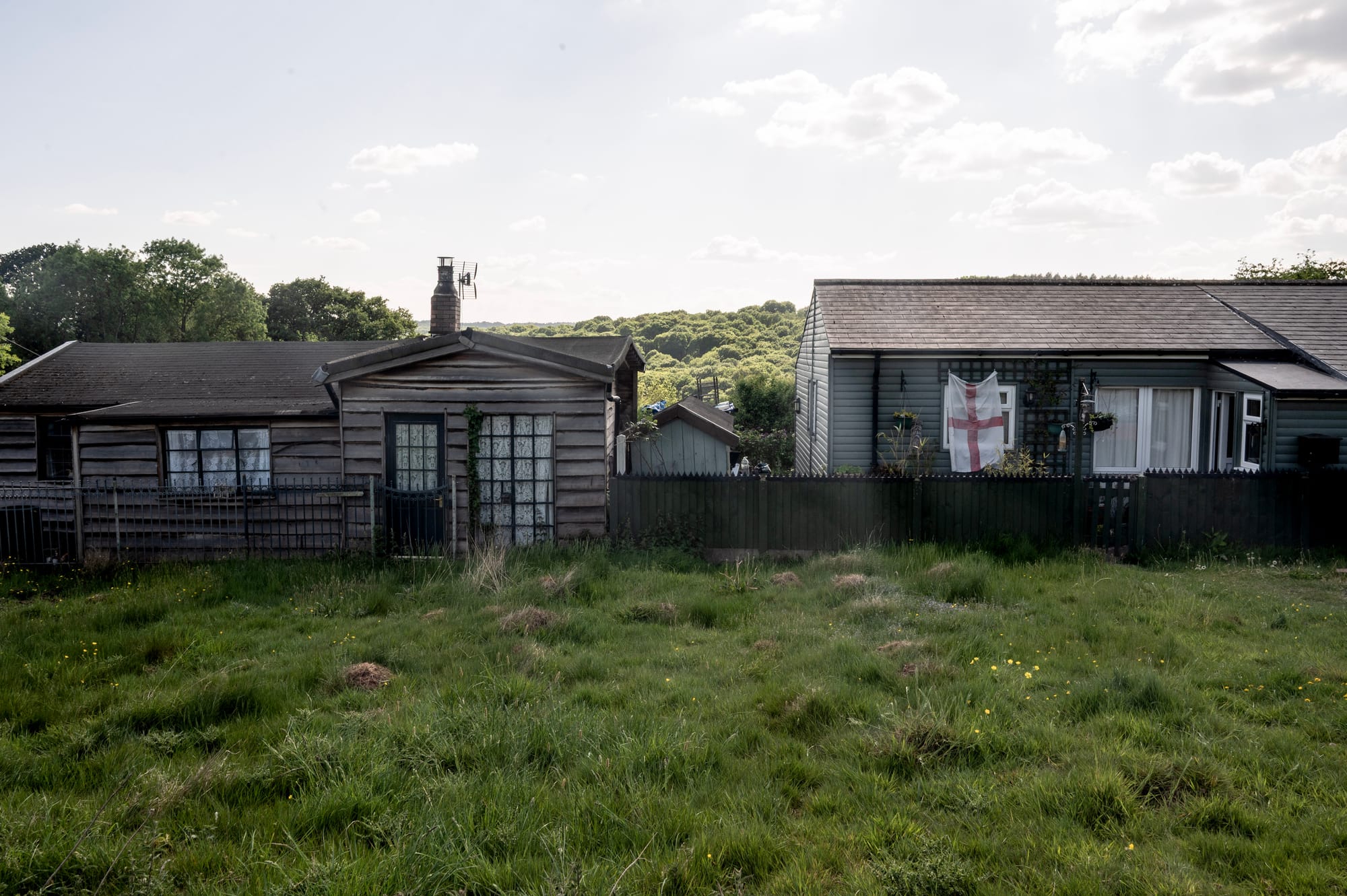
Some have thought about trying to plead their case with Wenman in person but in practice, this is difficult. He’s described to me by various locals as incredibly reclusive and his actual address is a mystery. Some residents believe he’s holed up in a caravan outside Hill Farm’s main house. The farmhouse, from the distant look I get at it, appears almost derelict. Others think he’s based in Worthing, Sussex, or Watford in Hertfordshire. If Wenman is in — or around — Hill Farm, there’s certain signs he doesn’t want to receive visitors: several large horseboxes are parked defensively to block the lane up to the house, resembling a French Revolution barricade.
The occupants of the horseboxes are also a point of contention. Wenman keeps “neglected” horses on the farm. Residents say the horses are also deprived of water, which has led to them breaking free of enclosures and rampaging through the plotlands, damaging cabins and vehicles. In March, the RSPCA removed 90 horses from the site over concerns for animal welfare, prompted by an incident where an escaped horse — accompanied by a foal — got stuck in a cattle grid one wet evening and had to be put down. Residents have erected a plaque to the horse at the site, covering the cattle grid in flowers.
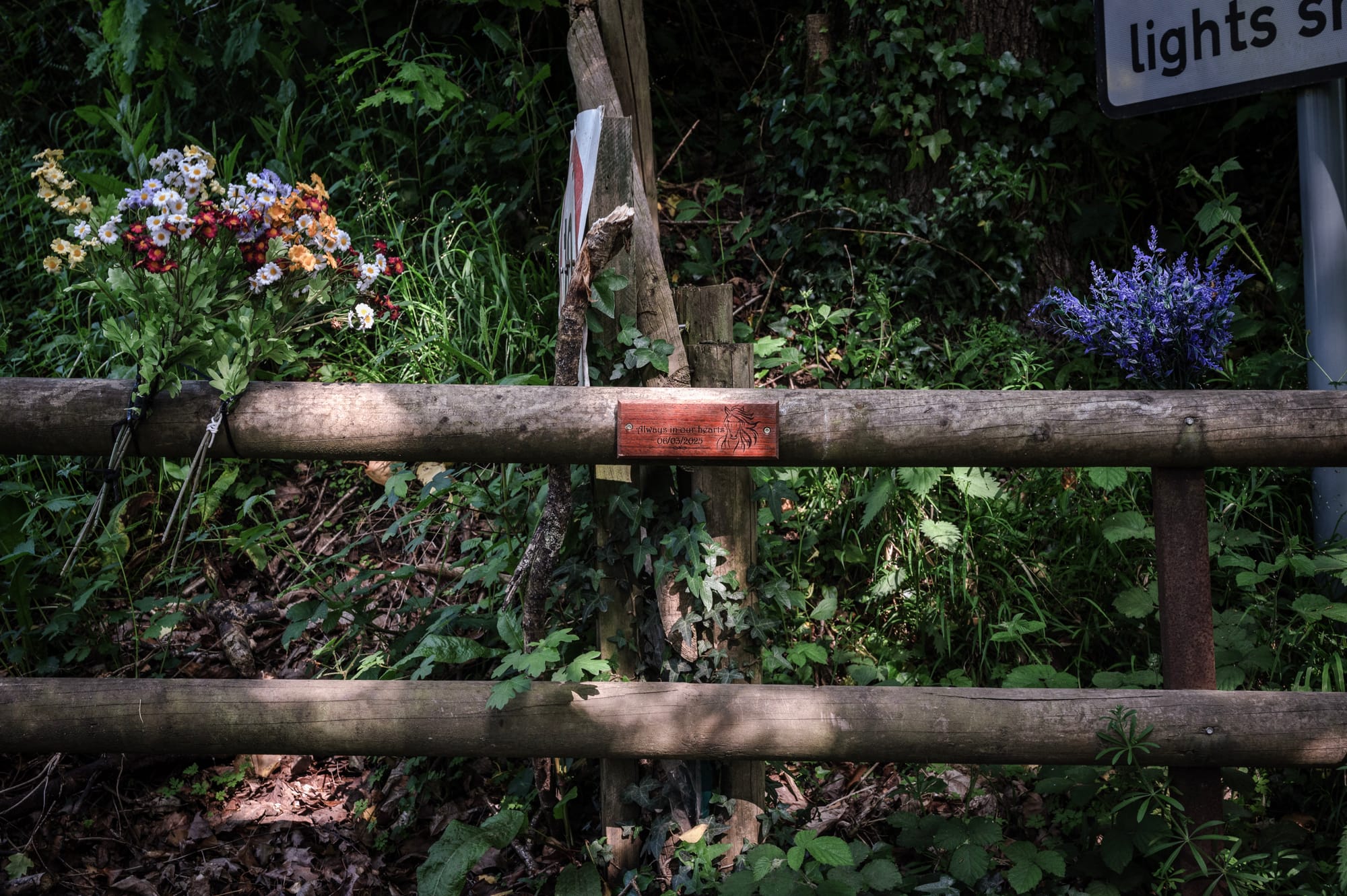
To the courts
The clue as to what drives Michael Wenman may lie in 2004 BBC South broadcast of regional news programme, Inside Out. In the episode, presenter Chris Packham heads to Redhouse, a mobile home park in Hampshire. Elderly residents allege that the park’s new owner had harassed them into selling their homes for huge losses. “He picks on the elderly, the disabled, families with children, those who are vulnerable,” one interviewee said. The park owner’s name? Michael Wenman.
At one point in the segment, an undercover reporter questions Wenman, a beefy, bullish man in a light blue shirt, with an Estaury accent. Unaware he’s being filmed, the developer explains his plans for Redhouse. “The idea is they take a bit of compensation and they leave. We take over the breaking up of the home. What we anticipate to be left is very very few — do you know what I mean?”
“Mr Wenman’s motive is simple,” summarises Packham. “Money. If everyone leaves, he can fill their plots with new mobile homes and sell them at a huge mark-up. In theory, the residents are protected because they have a legal right to stay. But that hasn’t stopped Mr. Wenman.”
Tony, a plotlander, thinks Wenman is just repeating the same playbook he applied to Redhouse. “The new guy doesn’t farm,” he says. “He just wants rent.”
It’s impossible to ask Wenman himself what he wants, because he won’t answer my texts. If it’s to scare off cabin owners, so far, so good: five have already left due to his alleged actions. But other residents won’t go without a fight. Instead, they’ve formed the Hill Farm Residents Association and are in the middle of a civil court case they have crowdfunded millions to bring. In fear of jeopardising legal proceedings, which are expected to recommence in around six months, they won’t be drawn on details — yet. Last year, Wenman made a rare public response to the campaign, telling The Kidderminister Shuttle that the plotlanders were "sent an open offer for 20 years and they refused it."
For now, the residents of the Bewdley plotlands are in no man’s land, stuck between jurisdictions and a hostile freeholder. “We’re stuck between two different worlds,” one plotlander tells me. Almost all of the authorities have told them that there is not much that can be done because the cabins are “on private land.” After an hour of talking, Jan and I turn around — a dribble of water comes out of the tap. She shrugs, “it’ll be off again soon enough.”
As we go to press, I get a text from Tony. “Did you manage to speak to Wenman?” He’s asking, it transpires, because the water supply has been returned to the plotlanders, some for the first time in 17 months. “It’s funny,” writes Tony. “He finally did something about the water after all this time.”
What do you make of the ruckus at the Bewdley plotlands? Let us know in the comments.


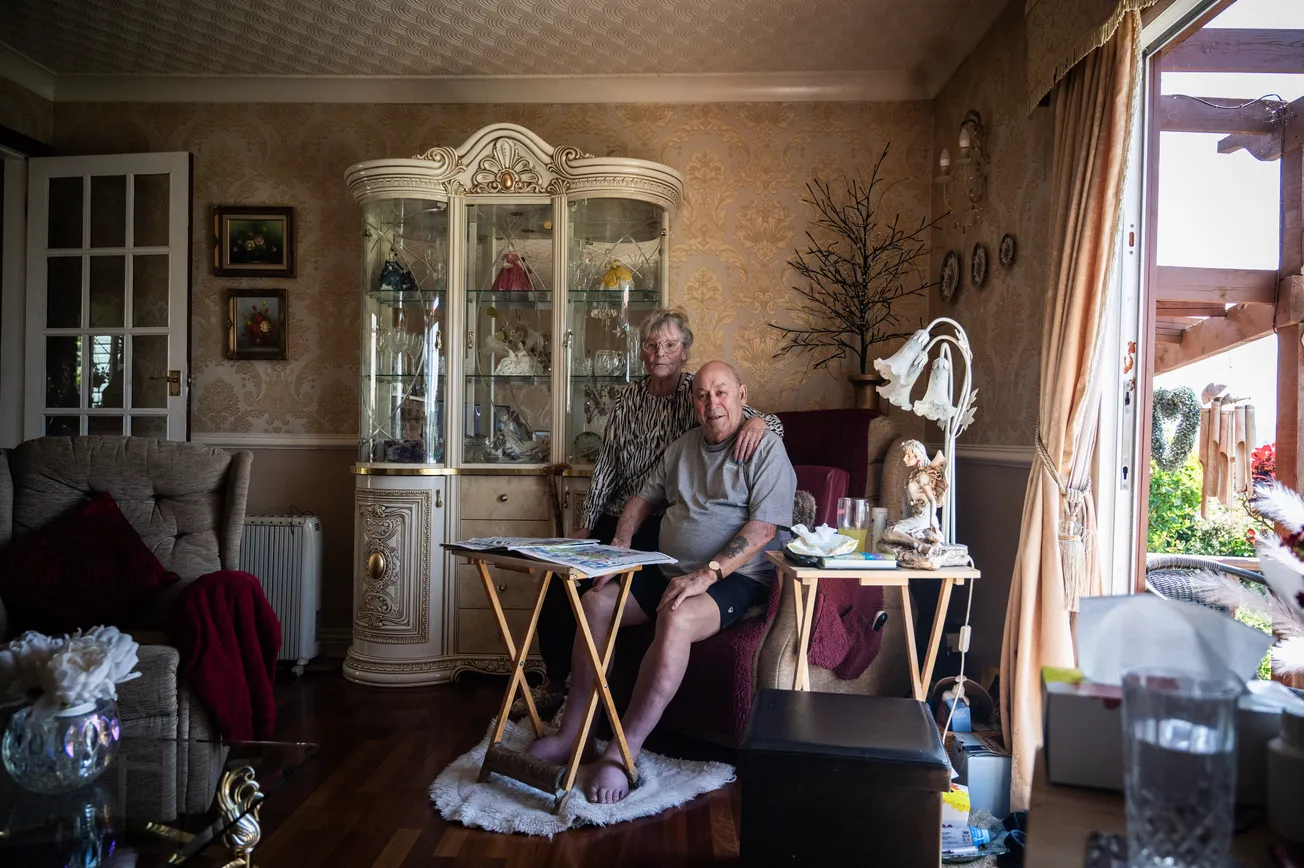
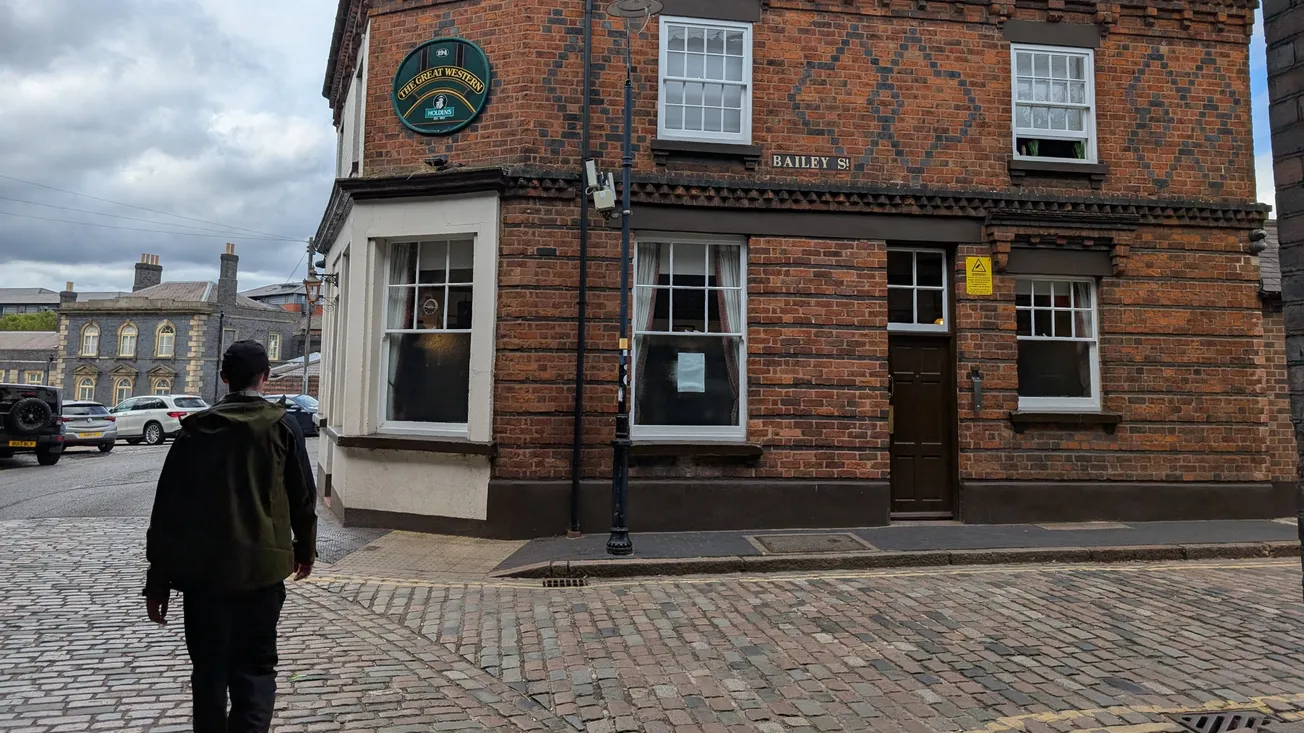
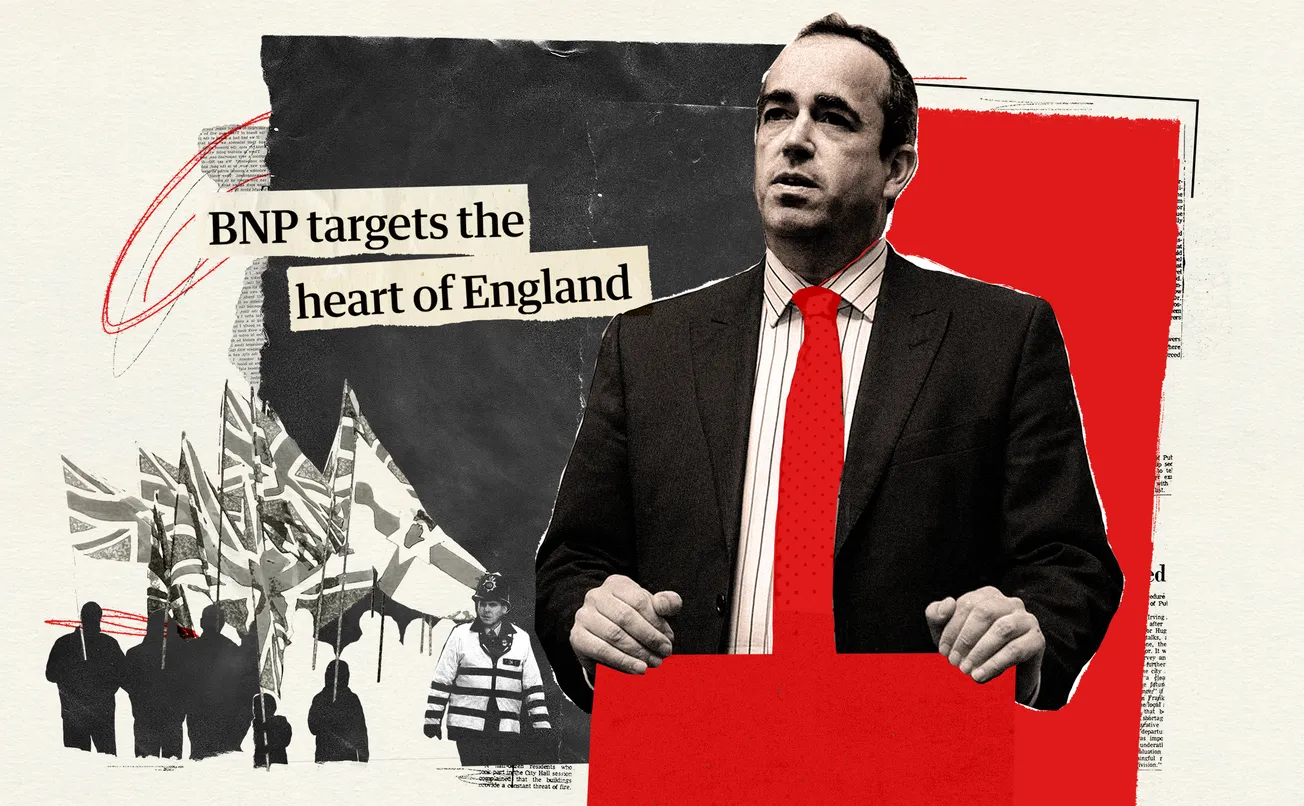



Comments